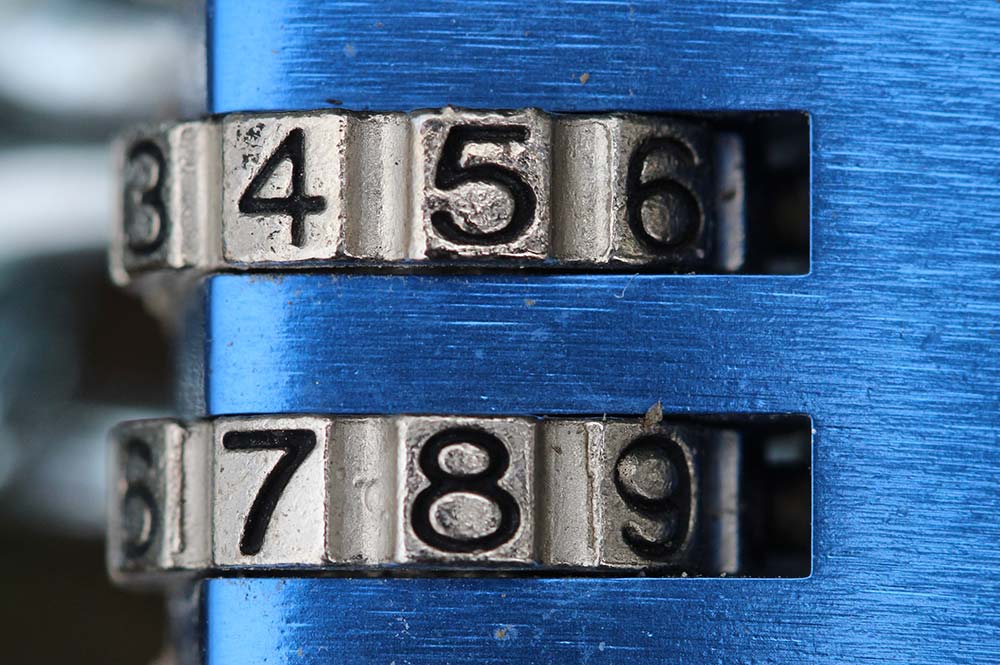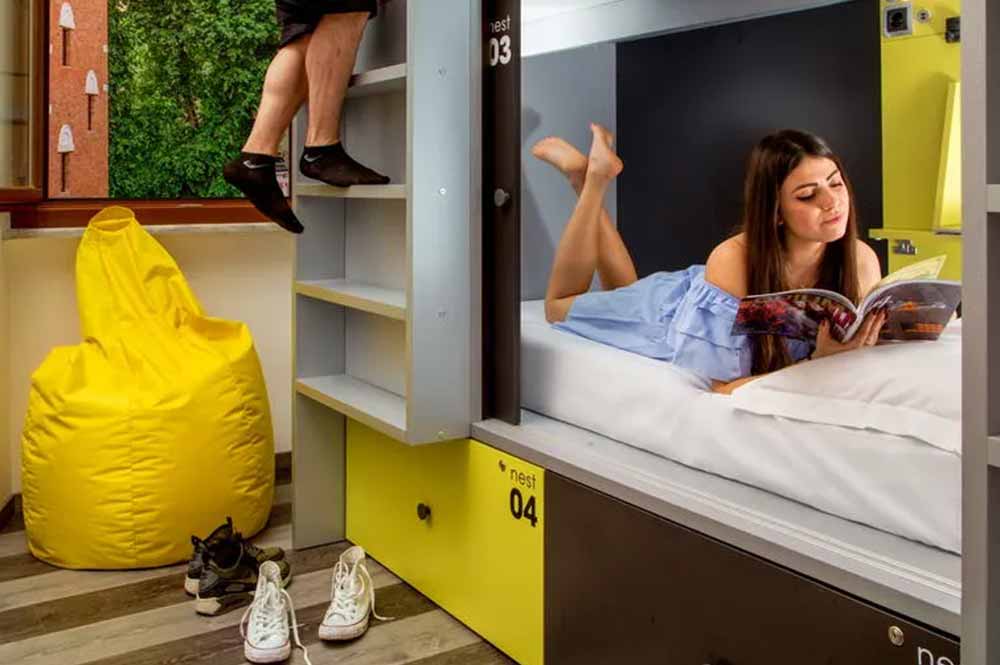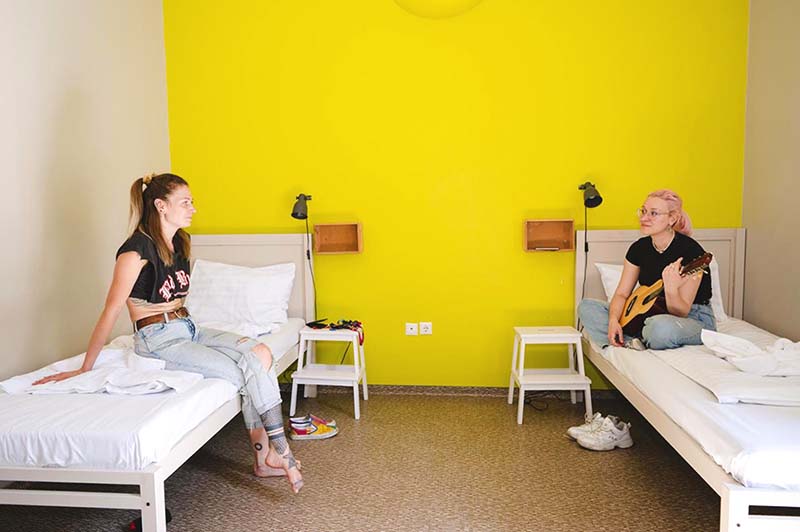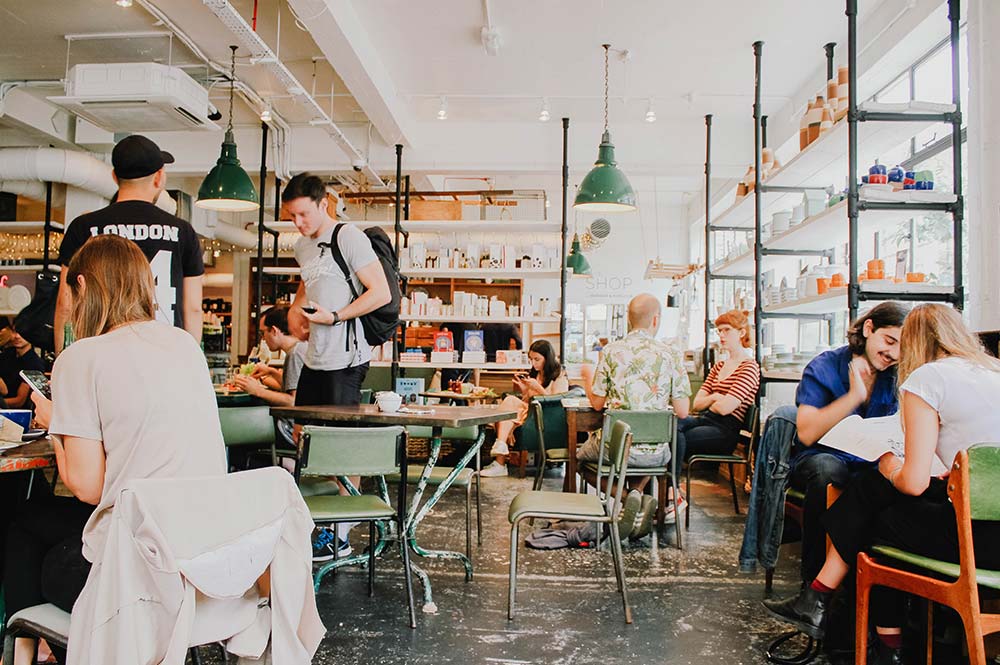Many people who have never traveled by hostel have a rather bleak view of them, and worry about the burning question; are hostels safe? Even seasoned travelers may be wary sometimes, but most people never run into any trouble at all in hostels.
Instead, they find affordable, social accommodations that allow them not just to discover the places they're traveling, but also a microcosmic world of international travelers to meet and spend time with.
Here's our guide to 13 Ideas to Save Money for Long-Term Hostel Travel.
So, are hostels safe? In our opinion; absolutely!
Personal safety isn't much of a problem in hostels - everyone, including the staff, look out for each other. The community spirit in many backpacker hostels makes them even safer than hotels. For sure, staying in a hostel is much more fun than a hotel room!
Theft, however, does happen occasionally.
Not many people really want to steal all your dirty clothes and travel-sized bottles of shampoo, but electronics, money, and other valuables sometimes walk away if you're not careful enough.
New to hostels? Here are some more helpful guides to get started:
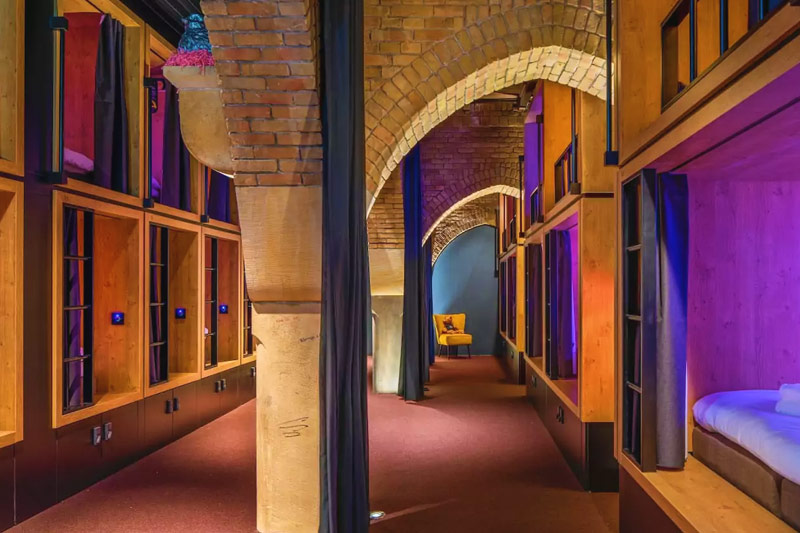
How Safe are Hostels? 11 Safety Tips Revealed
It all depends on who you end up staying with - there are many variables here, and it will change from hostel to hostel.
Overall, hostels work hard to create a safe, secure and fun environment for a range of travellers types - female solo travellers, couples, backpackers, groups, you name it.
Follow these tips and you will increase your chances of having only good times in your hostel experiences. You'll leave here ready to answer YES when someone asks you about hostels and that good old question; "are hostels safe?"
Have a read of our 17 Tips for Sleeping and Staying in Hostels.
Your Shortcut
Come on, let's jump in and talk hostel safety.
1. Check Reviews Online - always!
Hostel websites are a great resource for travelers.
They have useful information about amenities and policies:
- check in times
- communal kitchens
- dorm size
- lockers
- 24 hour reception
- security
You can also learn a lot about safety issues related to the hostel by reading the customer reviews, but keep in mind that reviewers tend to be people very happy or very unhappy with their experiences.
For a comprehensive guide on choosing the right hostel, check out our post on How to find Good Hostels?
The rarer moderate reviews are probably more accurate. Read several reviews, and only start worrying about things when there's consistency. Ask other travelers for recommendations once you start hostelling, you'll find that one of the easiest ice breakers is to ask fellow hostel guests where they've been. For those heading to Rome, our list of the Best Hostels in Rome can help you find the best options based on reviews.
This leads to great on-the-ground intelligence not just about places to go, but hostels to stay in. You might even want to keep a list of recommendations and warnings. The hostel staff will also have recommendations, and may even make reservations for you at places they trust.
On Hostelz you can compare reviews from booking platforms such as Booking.com, Hostelworld and Hostelsclub in one easy click.
Read: How to search Hostels with Hostelz.com

2. Be Aware of the Neighborhood
Some hostels are located in rather sketchy areas: near train stations, right downtown, or in cheap rent zones. For tips on choosing the right location, read our guide on How to Book Hostels in Europe, which covers essential considerations for finding safe and convenient accommodations. This is very generically speaking. Every city is different! Do your research!
Though this usually isn't a problem, it doesn't hurt to take some precautions.
You're more vulnerable when weighed down by your backpack or other luggage, when you don't know exactly where you're going, so try to arrive during daylight, and act confident. When you check in, ask staff if there are any nearby streets or areas best avoided. If you are really unsure, then send an email or call beforehand. Ask for some safety tips and if there is anything you need to know beforehand.
Read up on How to find good hostels here.
They may even give you tips on how to avoid a typical scam, like fake airport cabs and such.
Plan your nights on the town so that you don't have to come back to the hostel late, drunk, and alone.
Also: Party hostels tend to be close to the nightlife which equals a loud, bustling neighborhood. So if you're not interested in this, make sure you book a quieter, more relaxed hostel.
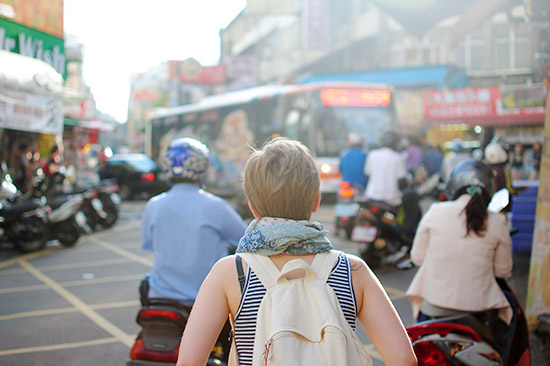
3. Leave Valuables at Home
The easiest way to prevent theft of your valuables is to not have them on you. It's amazing what you can survive without.
Take the minimum of accessories. Wear inexpensive jewelry. Skip the designer clothes. Don't take all thirteen of your credit cards.
Read: Packing Guide for Hostel Backpackers
Decide which of your fancy electronics you really need, and leave the rest at home. If you travel with a computer, use a cheaper or older model that won't bankrupt you to lose. Unless photography is your passion, content yourself with a moderately priced camera. This will reduce your losses in case of theft, and may save your back from excess weight.
More importantly, such austerity will help you focus more on the places you travel and the people you meet.
4. Don't Flaunt your Fancy Gadgets
Most people now travel with various cameras, computers, and/or phones. In fact, show me someone travelling without a Smartphone...
However, if you're uncomfortable at all with the hostel or your roommates, consider leaving these things in your bag. Not having your head buried in a computer makes you more accessible to new friends, and it also makes you a less attractive target for theft.
When people don't know you have something, they're less likely to steal it.
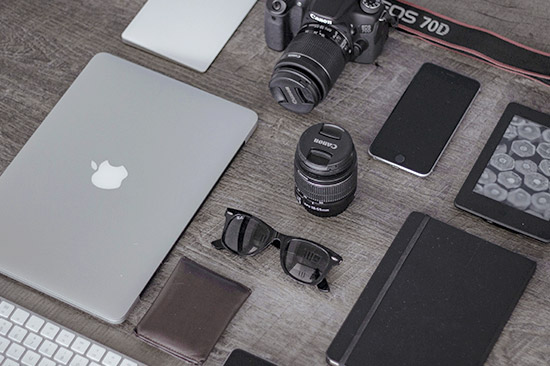
5. Use Lockers - always!
Many hostels offer lockers in your hostel room or out in the hall.
Some include the locks themselves and others don't. You should travel with a lock for such occasions. The best are good quality luggage locks with flexible lock cables, instead of thick metal bars, so that they fit into any of the many configurations of locker you'll find on your travels.
When lockers are available, use them for your valuables.
They will not stop a prepared and determined thief, but they'll cut out most crimes of opportunity. Some hostels also have a safe at the front desk for such things as money and passports. In some cases, when the hostel provides neither safes nor lockers, some people wear their money belts to sleep, or tuck their day packs into the corners of their beds, against the wall, under the covers.
To learn more about the types of security measures you can expect, including whether lockers are provided, read our article Do Hostels Have Lockers?.
You can also keep your backpack itself locked with a luggage lock, though this will only prevent casual theft. If lockers are important for you, you can research beforehand on Hostelz or the official websites to see if a particular hostel offers the service.
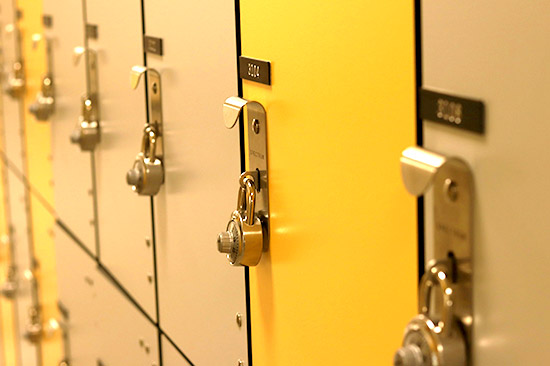
6. Make Friends
Talk to your dormmates and the other travelers at the hostel. One of the core joys of hostel travel is meeting people, hearing their stories, and exploring town with them. Making friends at your hostel doesn't just enrich your travel experience; it also adds a layer of security. If you're friendly with the other people in your dorm, they're more likely to look after you and your possessions. If you’re planning a trip to London, take a look at our insider’s guide to Best Hostels in London for safe and social accommodation options.
They're also more likely to report your absence in the unlikely case that you don't show up one night.
Making friends is easy when you are working at a hostel (5 reasons to try it).
Make lots of new friends, but exercise normal caution when going out with people you just met. Go in groups, stay in public, and drink moderately. Be careful how you flirt. Different cultures and individuals flirt in different ways. Behavior you think perfectly appropriate may border on harassment to someone else. You may also send false signals about your willingness to pursue a physical relationship.
If you’re looking for more tips on how to make the most of your social experience in hostels, check out our guide on How to Make Friends in Hostels - 9 Simple Tips.
Dress with reasonable modesty and be aware of others' social cues. Try not to be offended by behaviors different from your own. Most such discomfort simply falls into the category of culture shock.
If it escalates beyond that, however, be assertive and inform hostel staff.
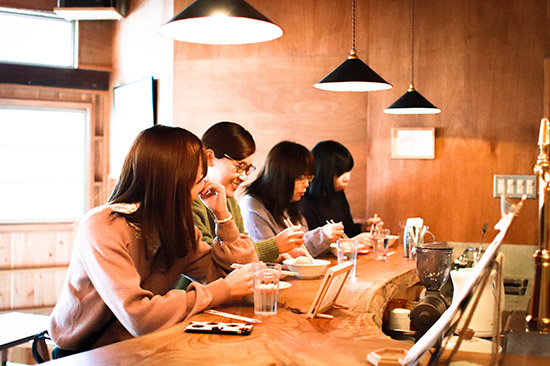
7. Feel Safe in your Room Choice
If single-sex dorms are important to you, do your research first about your chosen hostel and find out what kind of rooms they offer. This is especially important for female travelers going it alone.
It would be silly to turn up on the day and find out they do not have the room you prefer.
This is why booking hostels in advance is a good idea!
Once you've checked in and soon decide you are uncomfortable staying in a mixed-sex dorm, let hostel staff know beforehand. If they have single-sex dorms, they will usually make an effort to place you in one, or at least to place you in a mixed dorm which is balanced between men and women. For female solo travelers, our post on How To Pick a Perfect Hostel for Female Solo Travelers provides essential tips for a comfortable stay.
The same goes if you decide dorms aren't for you and you'd be much better suited to private rooms. Speak with staff and see if an upgrade is possible.
In the case of someone in your dorm room making you feel uncomfortable, honour that and move. Also make sure to report any untoward behaviour to hostel staff.
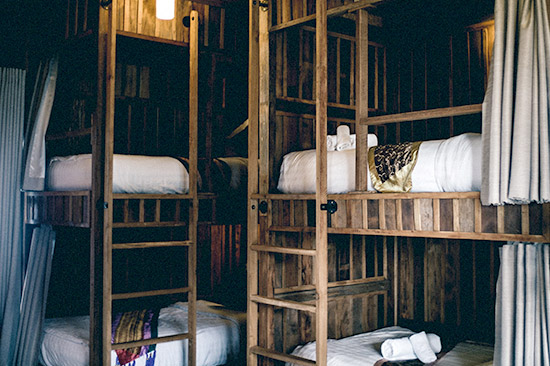
8. Keep a Flashlight within Reach
Pack a headlamp or a small flashlight on a cord, which you can lay on the floor beneath you or hang on the bed post of an upper bunk.
Then you'll always have a light, to see what's going on in the middle of the night. It might also prevent you from twisting an ankle climbing around in the dark.
9. Defend yourself against Common Germs
Are hostels clean? Hopefully the answer is always yes! Yet, no matter how "on it" the staff are, sometimes it's the hostel guests themselves that create the mess.
Top tip: pay a few extra coins and avoid super cheap hostels - you get what you pay for.
Pack plastic or foam sandals you can wear around the hostel and right into the shower. This will help keep you clean and safe from various ailments, such as athlete's foot, that occasionally visit communal spaces.
Also, consider carrying a reusable cloth that you can use to wash dishes in the common kitchens before you use them. You have no idea what germs have been shared on that ancient sponge in the kitchen. Don't reply on fellow travellers to wash up properly, if at all!
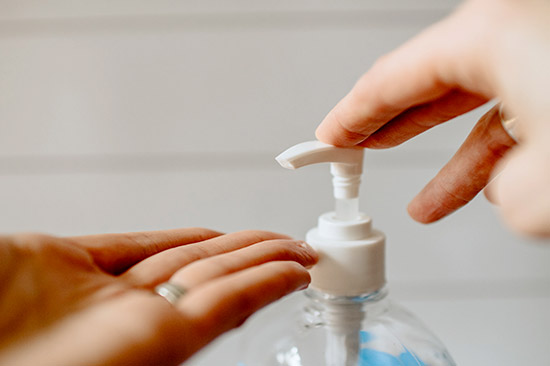
10. Leave your Itinerary
If you're planning on doing solo hiking or any such activity, you might want to leave your plans with a friendly dormmate or with the hostel staff. That way, if you run into trouble, someone will know where you were headed and when you should have been back.
In case your day starts early before the world has woken up, leave a note by reception. Ideally you should let someone know the night before to make sure the message is recieved.

11. Find Travel Buddies
Many hostellers travel alone. In fact, hostels are the home of the solo-travellers of the world.
Solo travel can be exhilarating, but even those who prefer traveling alone sometimes enjoy finding travel buddies. This may mean spending the day exploring a castle or hiking a volcano. It might mean a few days together on the road. This is especially good if you're planning on going somewhere dicey, where traveling in pairs or groups is safer.
Hostels are a great way to find such like-minded travelers - one of the reasons hostel life is much better than real life.
Before setting off to anywhere remote, however, make sure you spend some time with your potential travel mate/s, so you can establish trust, and always keep someone at home informed of your plans.
12. Hostel Safety in Europe: The Facts You Need
So.. are hostels safe in Europe? Well, Europe is a large and diverse continent, so hostel safety can vary significantly between countries. Broadly speaking, European hostels are generally safe due to a thriving backpacker culture. Popular regions like Western Europe have hostels that prioritize security with features such as 24-hour reception, lockers, and secure key-card access. Safety varies in big cities — petty theft in tourist hotspots like Paris or Barcelona is something to stay aware of.
As Always:
- Always check recent reviews for safety mentions.
- Ensure the hostel provides lockers for securing valuables.
- Look for features like key-card access and 24-hour reception.
- Be aware of petty theft hotspots, especially in major cities like Paris or Rome.
- Consider hostels with female-only dorms if traveling solo as a woman.
Hostel safety in Europe largely depends on smart choices and situational awareness! If you're traveling to Barcelona, our guide on the Best Hostels in Barcelona can help you find well-reviewed and secure hostels.
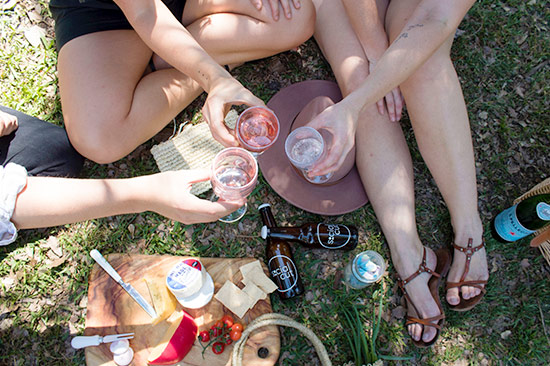
Common Questions about Hostel Safety
What are hostels in Europe like?
Safe, fun, social and well-located. Don't take our word for it; check out all Europe hostels here.
Are hostels in London safe?
Yes, hostels in London are generally safe, especially those with features like 24-hour reception, lockers, and key-card access. Luckily for you: we’ve curated recommendations for safe hostels across Europe’s major cities, including London.
Are hostels in Paris safe?
Hostels in Paris are safe, especially if you choose well-reviewed ones in reputable neighborhoods like Le Marais or Montmartre. Check out our curated list of the safest hostels in Paris.
Are hostels safe for families?
Absolutely! Many hostels have rooms specifically designed for families. They may even include children's games, a garden to play in and meal deals.
Are hostels safe for female solo travellers?
Female solo travellers will love hostels, especially because so many of them include female-only dorms these days. It's great if you don't want to share a room with boys, and adds to your personal comfort and security.
How do you know a hostel is safe?
Firstly, check honest reviews of people that have stayed here! A great resource for this is Hostelz.com, Hostelworld.com and Booking.com
Make also sure the reviews are recently written.
You can also research your chosen hostel and see if they include things like lockers, 24hr security and good locks on the room doors. Another good thing to check is the location of the hostel.
Are hostels safe for transgender people?
Hostels don't discriminate - they welcome all kinds of people from all walks of life. If you're unsure, you can always send an email to the hostel before booking/arrival.
That being said, there are always exceptions. Keep an eye on the reviews here as well.
Are backpacker hostels in India safe for women?
We'd recommend booking a hostel in India that only accepts international travellers. Check to see if there are female-only dorms available, or consider booking a private room.
Are hostels dangerous?
No, Hostels themselves are not dangerous. It always depends on the people in the hostel, the current circumstances of the country etc. Take precautions; looks after your things, report strange behaviour to staff and do your research.
Also, always use the locker for your valuables. Do not leave your cash or wallet laying around. This is in general not a good idea.
Summary: Are Hostels Safe?
Hostels are a fantastic experience, no matter whether the facilities are spotless or not, whether you have spacious community kitchens or have to eat crackers huddled on your bed. Whether you're right downtown with a nightclub below you, or out in the country in an old villa, whether you meet crazy fun characters to sing around a guitar with, or intense intellectuals to discuss politics with.
From hostels in Europe to New Zealand: every hostel has worked hard to be safe and secure.
Every experience is different, and that's what makes it fun, though it takes a bit of flexibility to fully enjoy your time. Especially if it if your first time experiencing a youth hostel.
Stay aware, follow these travel tips, and most likely you won't have any problems keeping you and your possessions safe while staying in hostels.
The only problem you'll face is when you have to return home and leave the hostel life behind!
Hostelz.com is the world’s most comprehensive hostel-focused travel platform. We bring together listings from all the major booking sites to help you easily compare prices, see real guest reviews, and find the best deals—no matter where you’re headed. Check out our How It Works page.
Not sure which hostel to pick? Use our Hostel Comparizon Tool to compare your favorite hostels side-by-side before you book.
Let us help you travel smarter and sleep cheaper.
You are Overpaying for Hostels - that Stops now!
Platforms like Hostelworld and Booking.com often have different prices for the SAME room. Even availability can vary depending on the site. 😱
That’s where Hostelz steps in. We are the ultimate price comparison tool for hostels. Save up to 23% on your next booking.
Tours & Activities for Solo Travelers
Join group tours, find hidden gems, and meet fellow travelers! GetYourGuide offers thousands of experiences perfect for backpackers and solo adventurers.
Easy Visa Applications Worldwide
Need travel documents fast? iVisa handles the paperwork so you can focus on planning your adventures, not stressing over entry requirements.
Easily Compare Travel Insurance
Starting from $42/month
Starting from $50/month
Affordable and customizable
Volunteer at Hostels Around the World
Exchange your skills for free accommodation and dive into local cultures with Worldpackers. How to find Volunteering Jobs and Travel the World? Our step-by-step guide.
